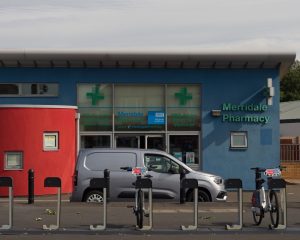It’s been a pretty good year for the fledgling pharmacy app Charac, according to its founder, the e-commerce delivery platform entrepreneur Santosh Sahu.
To celebrate the SaaS start-up’s revenue growing by 177% and its staff swelling by around a third, the self-made millionaire took his team to the All Star Lanes bowling alley in London’s Holborn.
A delivery platform kingpin who initially moved from India to Ireland to work as an IT consultant, Sahu claims that Charac is now the fastest-growing patient relationship management platform.
“We’re setting our sights on 300% growth this year,” he says during our video call.
But for this to happen and for UK patients to truly benefit from pharmacy apps like Charac, Sahu is aware that he first needs a few strikes under his belt in a sector that possesses more silos than a North Dakotan grain farm.
What is Charac?
A riff on the word ‘Charka’, Charac pays tribute to the many pharmacists across the UK who hail from a South Asian background.
The SaaS-based NHS-integrated platform claims to allow pharmacists to manage repeat prescriptions, access patient records, create bookings, and conduct consultations.
The idea is to relieve time pressure and increase efficiency on Britain’s strained National Health Service, enabling the growth of community pharmacies that may previously not have been online.
Charac also allows patients to order prescriptions online through its delivery function and the Royal Mail is one of its investors.
According to Sahu, while the company was founded on the eve of the pandemic, and its onslaught indeed precipitated demand, his vision for this platform was long-standing and informed by personal and professional experiences.

Charac founder and CEO Santosh Sahu
As a person with diabetes, he recalls growing tired of not being able to order and track his crucial prescriptions online.
“Every month, I’d ring pharmacies saying, ‘Could you please order my repeat prescription?’. I’d ring three times before they picked up my call — they’d always ask the same questions. Then I’d have to call again in four days to see if it’s ready.
“After four days, they either don’t have my prescription or only have part of it. For a digital native person like me, my expectations are managed by Uber or Amazon.
“When I order a taxi, Uber keeps me informed of what’s happening. I’m not calling somebody. Deliveroo, Amazon: they are managing me, not the other way around. When it comes to the most important part of my life, my health, why am I chasing them?”
He believes many community pharmacies today are in the same position that online fashion retailers found themselves in 15 or 20 years ago.
One of Sahu’s previous ventures, On the Dot, a delivery platform, was founded to help businesses deliver retail goods to customers at times that were most convenient for them.
He argues that to survive now, pharmacies must adopt a more seamless, omnichannel approach—from diagnosis and prescription to order and delivery.
“Some fashion retailers weren’t ready to have online stores, and many didn’t survive. For every pharmacy today, it’s necessary to have an online presence and think more like a retailer.”
Even though prescriptions still dominate pharmacists’ work and are cushioned to some extent by the guaranteed income of an NHS contract, Sahu claims that prescription revenues are dwindling.
“So, there’s a paradigm shift for chemists to think like retailers about how to add more services, private services, to interact with patients digitally, and to improve operational efficiency in stores.”
Pharmacy First
The need for pharmacists to supercharge their operational efficiency in the UK has grown since the UK government introduced Pharmacy First.
This means that, since the beginning of this year, community pharmacies have been able to offer treatment for seven common conditions without a doctor’s visit.
NHS England initially announced that more than nine in 10 community pharmacies in England — over 10,000 in total — would offer the checks under the scheme.
The scheme aims to reduce pressure on GPs and the delays many patients face in receiving care.
Industry backing
Thanks to Sahu’s previous track record as a solid founder and the AWS-powered platform’s focus on data protection and GDPR, Charac is now NHS-approved and appears on its website alongside other recommended online pharmacy apps.
While coy about revealing Charac’s exact user numbers, as of February this year, the platform claims to have over 20% of pharmacies and access to 7.5 million patients utilising its platform in the UK.
Dassault creates digital twin of the heart
This has been achieved through strategic partnerships, including with Positive Solutions, a patient management recording system, and the National Pharmacy Association (NPA).
The firm has raised £4m in financial backing, with £1.2m in debt and equity financing from the NPA, the Royal Mail, and individual pharmacy owners.
Some of these funds have gone towards acquiring growth: Charac bought order fulfilment system Pro Delivery Manager last month, enabling the platform to make 18 million prescription deliveries every year to over 7.5m UK patients.
Competition
Charac is by no means the only start-up operation in this space. US-based Truepill, founded by Sid Viswanathan in 2016, expanded rapidly into other territories before pulling back in 2022. Its UK arm was then snapped up by B2B pharmacy platform Phlo, which claims to be a market leader.

Even Amazon wants to become ‘the Amazon of pharmacies’
According to a recent Bloomberg report, most of these new players also claim to be “the AWS for pharmacies”, though Amazon has itself expanded into this area with mixed results.
Formed in 2020 and operating initially in the US, Amazon Pharmacy was built by buying a pair of pre-existing businesses: One Medical and PillPack.
Although it doesn’t appear to have disrupted the sector, it pretty much duplicates services that other online chemists currently offer.
While most existing apps are prescription delivery services, Charac claims to be the only app currently offering holistic digital transformation for pharmacies.
Closed systems
According to Sahu, the main barrier to further growth and efficiency is not competition from rival platforms but the very system it wishes to serve.
The founder recognises that in the NHS, links between primary and secondary care systems and pharmacies remain disjointed and siloed.
“There needs to be a coexistence and co-working between primary care, secondary care and pharmacy systems. I’ve been talking about this for a long time.
“There’s a lot of protectionism; people want to protect their contracts, systems and patients,” says Sahu.
As a case in point, within its first few months of Pharmacy First, the initiative has struggled, with the NPA and others reporting that GPs are refusing to refer patients to chemists.
Says Sahu, “It was a rushed rollout, and not all the dots are connected. I read one statistic that said 70% of referrals from the GP to the pharmacies are not qualified for Pharmacy First.
“Ideally, GPs should have used tech like Charac within their surgeries so that when they refer, the patient can follow a triage system and know whether they qualify before they walk into the pharmacy. But that was not done.”

UK’s Pharamacy First initiative is reportedly causing confusion among GPs
Sahu says government intervention is needed to create a more seamless solution where multiple players can operate, speed up efficiency, and add new services. The model lies with the regulations it sets up for the fintech sector and open banking.
“All the legacy players protect the current system because they want everything locked in. But that’s preventing change in the industry.
“The NHS needs to bring all the stakeholders together just like the UK banking sector did with fintech. The fintech revolution wouldn’t have happened if the regulator hadn’t gone to all the banks and said: ‘You need to participate.’”
At the centre of the fintech revolution are Open APIs, something that Charac has long campaigned for in NHS.
While the NHS is working to open APIs across its systems, Charac claims health-tech providers are pushing back. These providers are using the NHS’s open APIs while denying access to their own systems, leading to a fragmented ecosystem.
Banking regulations such as the Payment Services Directive 2 (PSD2), which came into effect around six years ago, encouraged banks to open their payment services to other companies or third-party providers, leading to a thriving fintech sector in the UK.
Could similar legislation in healthcare achieve the same thing? Sahu thinks so, referring to the rise of the neo-bank: “Monzo and Starling are competitors, but both have benefited from the government’s open regulatory framework. The ultimate winner is the consumer.”
Future vision
Next for Charac is the launch of an over-the-counter product range and an AI-powered chatbot that will aid pharmacists with diagnostics.
Sahu’s vision for the future of the community pharmacy is very different from the shop you walk into, the one that sells perfumes, diabetic lollipops and hair slides with a hardworking pharmacist, pen-in-pocket and a dozen prescriptions, trying to manage the lunchtime rush.
“That is all going to change. You will walk into a pharmacy, and it will look more like a private hospital. You will have clinical rooms where treatments are going on. Walk-in clinics.”
He adds that automated dispensers with screens will be available where patients can print out prescriptions, collect them, book an appointment, and review the status of their medication. Everything will be attached to an app.
He says you may not even have to walk into a pharmacy for prescriptions if you set up a subscription to have them delivered to your home.
If none of this seems particularly disruptive to the consumer, it’s because these services already exist in food, retail, and even banking, just not yet in health.